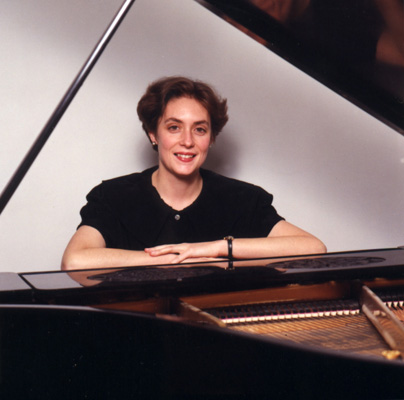
| Deutsch |


|
| Deutsch | |

Shopping Cart
|
| Home | Offer & Demand | Agency | News / Archive | Jazz in Austria | CD-Label / Distribution | Auction | Press | About us |
|
|
Musician Portrait Eugenie Russo
Eugenie Russo was born in New York City. She studied piano at Oberlin Conservatory with Jack Radunsky, in Vienna with Carmen Graf-Adnet and in Salzburg with Elizabeth Leonskaja before obtaining her diploma in piano performance with Hans Graf at the Hochschule für Musik in Vienna. Ms. Russo has performed as a soloist in Austria, Germany, Italy, Spain, Turkey, Russia, Finland, the Czech Republic, Poland, Hungary, England, Japan and the USA. In 1986 she made a successful debut at the Carnegie Recital Hall in New York. Radio and television appearances for the Austrian State Radio, Saarland Radio in Germany, Czech State Radio, Leningrad Television, NTV in Turkey, and National Public Radio USA. She has also participated in the PBS television series ”Bernstein-Beethoven” and in both 1987 and 1992 was appointed artist-in -residence by the State of Virginia, USA. She recorded three solo albums for the world corporation YAMAHA’s Disklavier in Tokyo. Ms. Russo has performed as a soloist at the Capella Hall in St. Petersburg, at the Grosser Musikvereinsaal in Vienna and at Carnegie Hall in New York, and at many international festivals such as the Wiener Musiksommer, the Wiener Festwochen, the Bartok Festival in Hungary etc. In 2000 she premiered works by Egon Wellesz at Leighton Hall in London. Ms. Russo is head of the Piano Dept. at the Josef Matthias Hauer Conservatory in Wiener Neustadt, Austria. And Professor at the ”Vienna International Pianists” Summer Academy since 1999. Recent recordings include two solo albums of American music on the English label Campion records: Aaron Copland (RRCD 1336) and George Gershwin (RRCD 1337). In addition, Ms. Russo has made a number of chamber music recordings including the Brahms Hungarian Dances arranged for violin and piano by Josef Joachim with violinist Yuval Waldman. Her most recent solo recording is Images with the music of Johannes Brahms, Claude Debussy, and Egon Wellesz , a successful premiere recording of the Dances, op 10 (see CDs in this article). At her concert for the Vienna Festival 2003 on June 4 at the Arnold Schönberg Centre in Vienna, Ms. Russo performed music by Alexander Zemlinsky, Egon Wellesz, Viktor Ullmann, Arnold Schoenberg und Alban Berg. The 6 Piano Pieces by Egon Wellesz: 6 Klavierstücke, op. 26 (1918) with the movements ”Langsam - Leicht bewegt – Langsam – Allegretto – Adagio – Wuchtig were a real treat and high point of this successful recital, especially considering that Egon Wellesz is a rarely performed composer. Please refer to the program of this concert listed in this article. Programme: Alexander Zemlinsky: 4 Fantasien über Gedichte von Richard Dehmel für Klavier, op.9 (1900) Stimme des Abends Waldseligkeit-Liebe-Kaeferlied Egon Wellesz: 6 Klavierstücke, op. 26 (1918) Langsam” Leicht bewegt-Langsam-Allegretto”Adagio-Wuchtig Viktor Ullmann: 2.Klaviersonate, op.19 (1936-1941) Allegro energico e agitato-Moderato-Prestissimo Arnold Schoenberg: 3 Klavierstücke, op. 11 (1909) Alban Berg: Sonate, op. 1: Maessig bewegt (1906-08) Concert Date: Thursday, 20 November. 2003, 19.30 Institut Francais de Vienne, Salon rougeWähringer Straße 30, A-1090 Wien Program: Lully, Satie, Debussy, Ravel Pressestimmen / Press Reporting Frankfurter RundschauJuly 1, 1996, CD NEWS by Hans-Klaus Jungheinrich Die Bearbeitungen der Orchesterpartituren El Salon Mexico und Rodeo sowie vor allem Four Piano Blues und Piano Sonata bieten nicht nur Unterhaltsamkeit, sondern auch Poesie und Subtilität, geklärte Geistigkeit eines auch das Einfache und scheinbar Vernutzte zum ”Sprechen” Bringenden. Eugenie Russo artikuliert das mit Raffinement und technischer Bravour. September 1996 Russo´s thoughtful, undemontrative brand of pianism works especially well in the gentler numbers of Rodeo (”Corral Nocturne” and ”Saturday Night Waltz”), and she is equally sympathetic in the Four Piano Blues. Moreover hers is an extremely assured, notably concentrated interpretation of the powerful Sonata (1941), full of subtle colour and nuance. Fono Forum Mai 1996 Gewiß sind El Salon Mexico und Rodeo nicht nur wegen der folkloristischen Postkartenklänge die griffigeren Stücke. Aber das Blues-Quartett und die Klaviersonate sind als Wegmarkierungen einer Selbstfindung zwischen neuer (jazziger) und Neuer (avantgardistischer) Musik ebenso spannend. Eugenie Russo präsentiert beide Facetten mit Drive und Feeling. Sie wird der Ernsthaftigkeit der Sonata ebenso gerecht wie den Louis-Moreau-Gottschalk-Anklängen. April 29,1996 Copland´s Four Piano Blues, die den Abend eröffneten, strahlten in ausdrucksstarker Tiefe, dank Russos technischer Finesse und ihrem kräftig- markanten Anschlag. ...die 1941 entstandene Piano Sonata... Der Künstlerin gelang es, das etwas hektische Wesen, das der Komposition mancherseits zugeschrieben wird, zu bändigen; sie spielte leicht und nachvollziehbar... Editor: William Lawes Copland had the great American gift of sometimes setting down a few quiet notes which, when captured, convey a sense of vista, of silent and unending space, and this impression is frequently captured on this disc. New York born Eugenie Russo´s ...feeling for the Copland idom is evident... in Rodeo, her Corral Nocturne is very good, and the following Ranch House Party is about as wild as one can expect from ten fingers. May/June 1996 review by Richard Burke Her best work on the Gershwin disc is in the Preludes, where she captures the distinct mood of each piece perfectly....the Rhapsody and An American in Paris respond well to her attention to detail....Russo´s technique, musicianship and taste remain apparent. CDs
Please call us for further informations and bookings. Dieter Bock BOCK'S MUSIC SHOP |
|